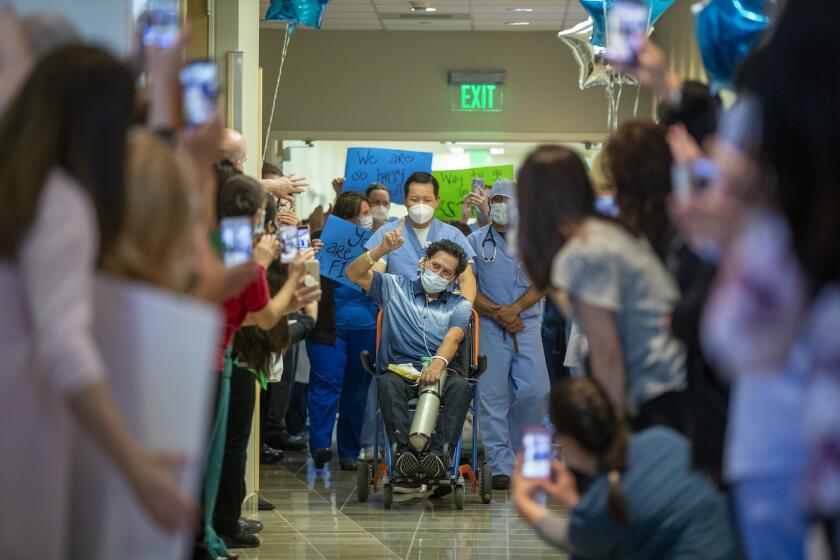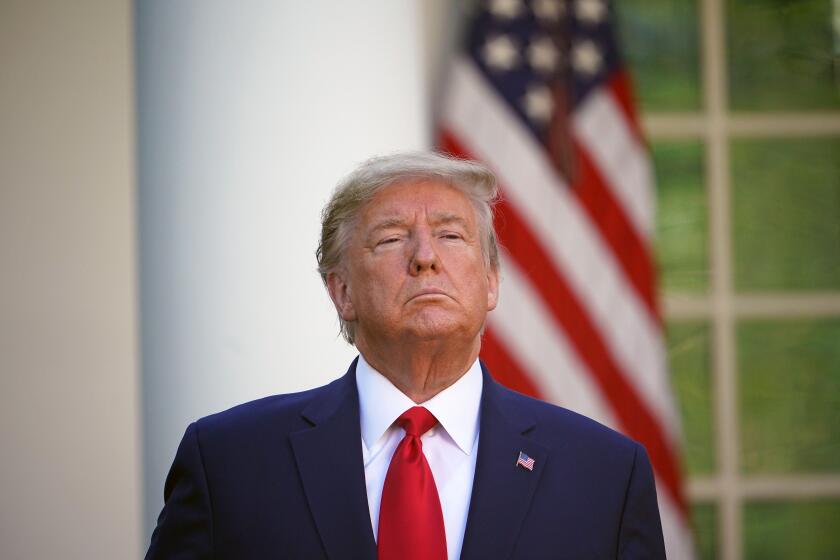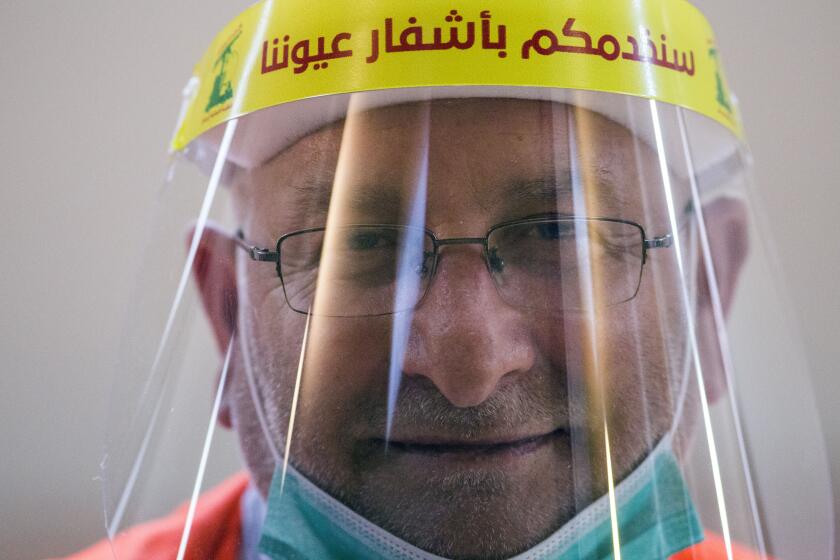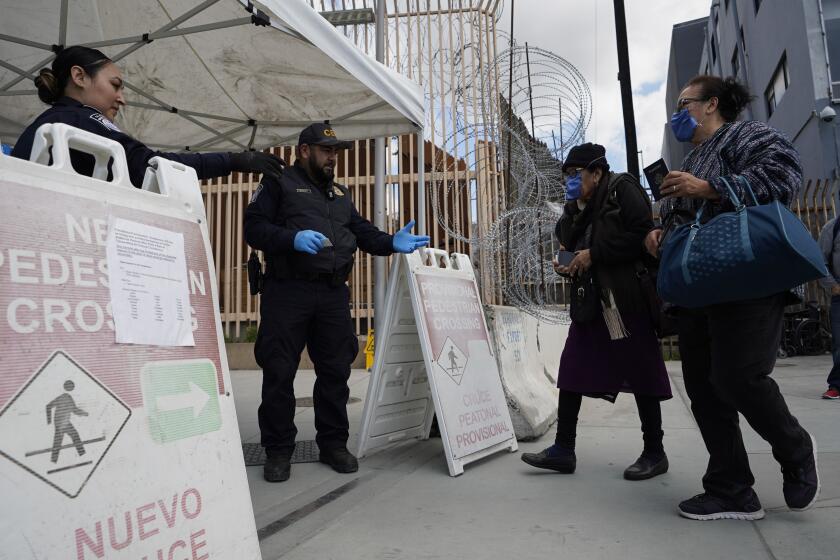Fox isn’t enough: Amid coronavirus crisis, Trump leans on a new media friend
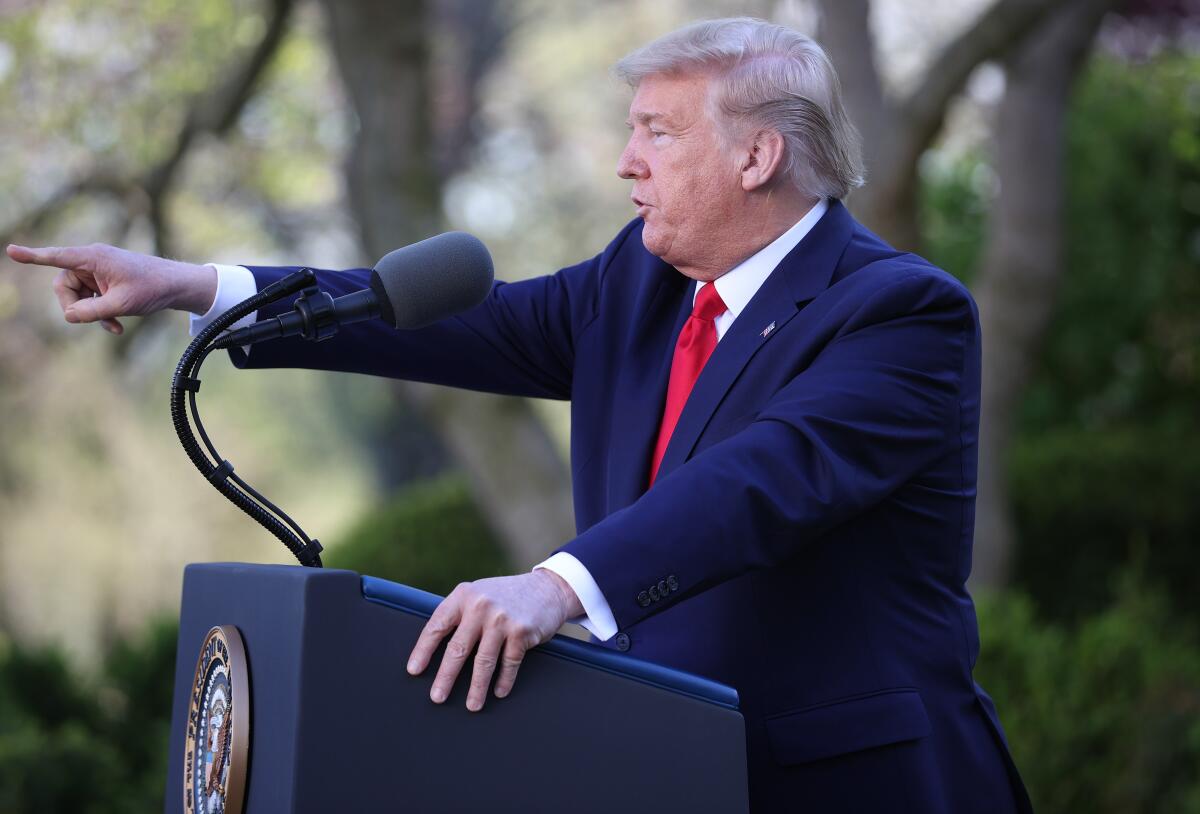
WASHINGTON — President Trump has made contentious exchanges with reporters a feature of his daily coronavirus briefings, often using personal invective to bulldoze past questions about shortfalls with masks, ventilators and testing and his own past statements.
But he has shown an altogether different response to one lesser-known media outlet that he has turned to repeatedly as a safety net, frequently citing them by name:
“OAN, please.”
These are some of the unusual new scenes across the Southland during the coronavirus outbreak.
At one recent briefing, Trump called on the outlet twice and elicited two versions of the same question — or statement.
“Mr. President, your approval ratings have been the highest they’ve ever been, as well as the ratings on your handling of the virus,” Jenn Pellegrino, the OAN correspondent seated among the press, said Sunday. “Yet there are some networks that are saying they’re debating whether or not to carry these briefings live. Do you think there’s a link between the two?”
“Well, I don’t know. I know that — boy, that’s a nice question,” Trump said. “Thank you very much.”
Minutes later, after he harshly criticized two other reporters who asked about his past comments by reading them aloud — he blasted Yamiche Alcindor of PBS for a “nasty question” and urged her to “be nice,” and then reprimanded Jeremy Diamond of CNN as producing “fake news” — he called on Pellegrino a second time.
She largely rephrased the same question she had moments before.
“What do you say to these detractors?” she asked.
Trump responded with a 463-word soliloquy in which he singled out three news organizations (CNN, the Washington Post and the New York Times) for criticism and insisted he wasn’t interested in his television ratings, before noting that the New York Times had reported his ratings rivaled those of football games, and then portraying himself as a victim of media censorship.
“I think it’s terrible. When they don’t want the president of the United States to have a voice, you’re not talking about democracy any longer,” Trump said. “Thank you very much.”
As he struggles with the biggest crisis of his presidency, President Trump has issued wildly divergent messages about the coronavirus, adding confusion to the stumbling federal response.
At Monday’s press briefing, OAN’s correspondent, Chanel Rion, seemingly went too far even for Trump, noting that the number of people who have died from the coronavirus was fewer than the number of fetuses killed in elective abortions and asking him to comment.
Trump demurred.
“What you’re mentioning has been going on for a long time,” he said. “It’s a sad event — lot of sad events in this country, but what we’re doing now, we’re working on the virus.”
On Tuesday, Trump again called on Rion, who asked about one of the president’s favorite subjects, the possible use of an existing drug as a remedy for COVID-19.
Rion was standing in the back of the briefing room. Under temporary rules implemented by the White House Correspondents Assn. to handle the current health emergency, only 14 reporters are allowed to attend the briefing each day and are spaced out across the room’s 49 seats, with others barred from standing in the aisles. News outlets rotate the assignment.
Before Tuesday’s briefing began, a representative of the correspondents association asked Rion to leave the room because it wasn’t her day to attend, but she refused, claiming she was there “as a guest of Stephanie Grisham,” the White House press secretary, according to reporters familiar with the exchange.
Neither Grisham nor Rion responded to requests for comment.
On Wednesday, after Rion again attended the briefing and stood in the back of the room in violation of the social distancing rules, the board of the correspondents organization voted to remove OAN from the seat rotation.
“We do not take this action lightly,” the board wrote in a statement announcing the decision, which did not name OAN. “This is a matter of public safety.”
Rion had similarly flouted the rules in late October, when she showed up one Sunday morning in the press pool — the rotating group of seven reporters given access, along with photographers, to the president’s Oval Office appearances, bill signings and some meetings — on a day when she was not in the rotation. Hours earlier, a U.S. special forces raid had killed the leader of Islamic State, Abu Bakr Baghdadi.
As the coronavirus spreads, the Trump administration resists pressure to ease sanctions on countries fighting the disease.
Trump made a point of complimenting Rion after she posed a question about whether his withdrawal of U.S. forces from Syria weeks earlier was related to the raid.
“It’s a great question,” Trump responded. “And you’re doing a great job, by the way. Your network is fantastic. They’re really doing a great job. Please let them know.”
Afterward, when other reporters inquired about Rion’s presence, administration aides insisted that she had not been specially invited and was merely “confused” about how the pool rotations worked.
One America News, based in San Diego, was founded in 2013 by Robert Herring Sr., a businessman who made millions with a company that manufactures circuit boards before going into media. The network has considerably less reach than the major cable news networks — appearing on many fewer cable systems.
According to five administration officials and outside allies of the president, Trump’s elevation of it has much to do with the biggest organization in the conservative news ecosystem.
“He often gets upset with Fox when their coverage isn’t as positive as he thinks it should be,” one official said, speaking on the condition of anonymity. “Pumping up OAN sends a message to Fox to stay in line.”
In an email, Charles Herring, the founder’s son and the president of OAN, wrote that the mission of his network’s White House coverage “is to provide fact-based coverage of the administration’s latest and breaking news.”
Asked about the network’s perceived pro-Trump bent, he added: “We generally don’t worry about or respond to media & advocacy critics. We focus on our mission. We value feedback from our audience and critique our coverage on an ongoing basis.”
OAN, Herring said, has a reporter at the White House seven days a week. The network’s persistent presence during a period when other organizations have stayed away due to health concerns has increased its visibility, especially now with Trump’s daily coronavirus briefings.
Even before this, however, Trump has made a point of elevating OAN’s visibility, sometimes at Fox’s expense. At a November news conference in the East Room, for example, Trump appeared alongside Turkish President Recep Tayyip Erdogan. The event was a “two and two” in press corps parlance, meaning that the leaders would each take questions from two U.S. journalists and two Turkish journalists.
Trump, the official noted, called on OAN first before calling on Fox. When it came time for Erdogan to select a reporter, the president urged him to choose “a friendly person from Turkey.”
“Friendly,” he riffed. “Only friendly reporters we like to see.”
Rion lists OAN third on a bio page on her website that describes her as an author and political illustrator and features photographs of her socializing with the president and first lady, as well as the president’s daughter Ivanka Trump.
Her cartoons have drawn attention for advancing conspiracies popular on the right fringe, including Pizzagate — the belief that prominent Democrats ran a child-sex ring from the basement of a Washington, D.C., pizza parlor — and the suggestion that Hillary Clinton was behind the killing of Democratic National Committee staffer Seth Rich, something that police have concluded was a botched robbery.
The virus has sidelined over 8,800 Homeland Security employees, about 300 for testing positive and others for possible exposure, the L.A. Times has learned.
In December, she traveled to Ukraine with Trump’s personal attorney, Rudolph W. Giuliani, to film interviews about the campaign to compel the country’s president to investigate former Vice President Joe Biden.
In a briefing-room appearance earlier last month, Rion asked the president, then facing allegations of racism for referring to COVID-19 as “the Chinese virus,” whether he thought “the use of the term ‘Chinese food’ [was] racist because it’s food that originates in China?”
Before Trump could answer, she accused members of the press corps of siding with the Chinese government.
“Is it alarming that major media players, just to oppose you, are consistently siding with foreign state propaganda, Islamic state radicalism, Latin gangs and cartels?” she asked Trump. “And they work right here at the White House with direct access to you and your team.”
Frank Sesno, a former CNN Washington bureau chief who is now the director of George Washington University’s School of Media and Public Affairs, said Trump’s public praise for OAN “continues his administration’s politicization and demonizing of media that they deem unfriendly.”
While presidents have long played favorites with the press, Trump stands alone in his demand for news coverage that overtly flatters him and criticizes his adversaries and his eagerness to set up the media as a political foil, Sesno said.
“I don’t think Donald Trump has any understanding of a free press. He wants a fawning press,” Sesno continued.
“When you have a crisis and lives are at stake, you need to set these things aside.”
More to Read
Get the L.A. Times Politics newsletter
Deeply reported insights into legislation, politics and policy from Sacramento, Washington and beyond. In your inbox three times per week.
You may occasionally receive promotional content from the Los Angeles Times.
